LEARN MORE
About Our Food
Our Ingredients
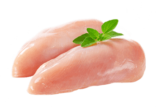
Chicken is an excellent source of lean protein, vitamin B, vitamin D, calcium, iron, zinc, and trace amounts of vitamin A and vitamin C. In comparison to most red meats, chicken contains two to three times more polyunsaturated fat and monounsaturated fat—healthier fats than those found in red meat. Chicken also has a total carbohydrate count of 0, no trans fat, and is low in sodium.
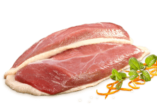
Duck meat is extremely flavorful and nutrient dense. It’s an excellent source of protein and healthy fat. Duck contains a variety of micronutrients, including iron, selenium, and a small amount of vitamin C. It contains a variety of B vitamins but is particularly high in niacin and B-12. Like other B vitamins, niacin plays an important role in converting carbohydrates into glucose and metabolizing fats and proteins. B-12 is essential for nerve function, red blood cell formation, and DNA synthesis.
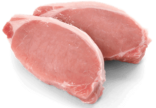
Pork is a good source of vitamins and minerals like phosphorus, iron, selenium, and thiamine. Pork is actually richer in thiamine than other red meats like beef and lamb. Vitamins B6 and B12, also found abundantly in pork, are essential for blood cell formation and brain function.
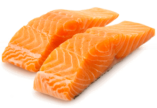
Salmon is a great source of omega-3 fatty acids, which support the immune system, may decrease inflammation, and can keep your pet’s coat looking shiny and healthy. It’s also a good protein source.
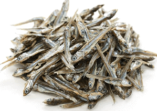
Anchovies offer many nutritional benefits for dogs. They are an extremely rich source of the highly beneficial omega-3 fatty acids eicosapentaenoic acid (EPA), and docosahexaenoic acid (DHA). In addition, they are protein-rich and high in calcium, iron and other minerals. Anchovies are also a healthy source of the vitamins A, E, K, B-6 and B-12.
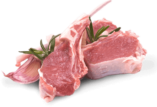
Mutton is a rich source of high-quality protein and many vitamins and minerals, including iron, zinc, and vitamin B12. It helps promote muscle growth, maintenance, and performance.
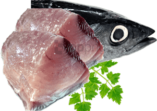
Tuna is an excellent source of vitamins and minerals, such as vitamin B12, iron, potassium and selenium.. The omega-3 fatty acids in tuna fish may also help to reduce cardiovascular disease. Tuna is also a good source of vitamin D, which is necessary for bone health, strengthening the immune system against disease, and ensuring optimal growth.
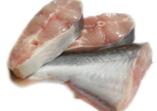
Patin is a good source of protein and other essential vitamins and minerals, including vitamin A, folate, vitamin C, calcium, iron and manganese. They also contain other nutrients like choline and are good sources of healthy, essential fats. Catfish have both omega-3 and omega-6 fatty acids.
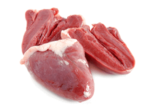
Poultry hearts are nutrient-dense organs that are a very healthy option for dogs. They are full of essential vitamins, and minerals are a great source of lean protein. Poultry hearts contain many B vitamins, as well as vitamin A, iron, copper, zinc, and phosphorus. They are also an excellent source of omega-3 and six essential fatty acids that are beneficial to your dog’s health. Poultry hearts are a great source of CoQ10, a protective super-antioxidant that promotes cardiovascular health, and taurine, an essential amino acid that also aids cardiac function.
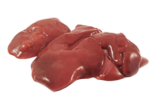
Poultry livers are rich in nutrients such as vitamin A, vitamin B, as well as trace minerals such as iron, zinc, copper etc. They are also a fantastic source of omega-3 and have been shown to improve vision and help with canine blood deficiencies.
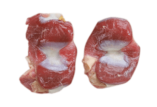
Poultry gizzards are rich in cartilage, zinc, vitamin B12 and iron. They are also a natural source of glucosamine, which helps support joint health.
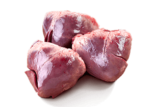
Pork heart is rich in folate, iron, zinc, and selenium. It is also a great source of vitamins B2, B6, and B12, all three of which are in a group known as B-complex vitamins. B vitamins found in organ meats have a cardioprotective effect, meaning they protect against heart disease. It also contains a concentrated source of the super-nutrient CoQ10, as well as taurine, an essential amino acid.
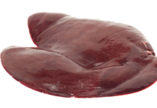
Pork liver is a nutrient-rich organ meat that can provide your dog with protein, fat and vitamin A. Pork Liver is also a good source of copper, iron, niacin, phosphorus and zinc. It provides many B vitamins, omega-3 and omega-6 fatty acids, and essential amino acids your dog needs from his diet to keep him healthy.
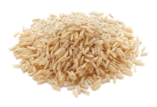
Brown rice is full of natural fiber, which helps a dog’s digestion. It is also an excellent source of carbohydrates, vitamins and minerals. Specifically, vitamins D and B — essential to heart health — are found in brown rice.
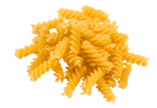
Pasta contains nutrients such as iron and vitamin B. It’s also high in fiber. Further, pasta is a carbohydrate, it’s rich in glucose and offers a source of energy for your dog’s body and muscles.
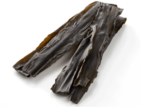
Kelp is one of the richest natural sources of amino acids; kelp is 25% protein and 2% fat. Full of bio-available vitamins and minerals, these sea vegetables contain iodine, which is essential for healthy thyroid function, and iron to support circulation.
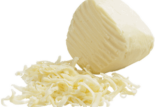
Cheese is packed with nutrients, including calcium, protein, phosphorus, zinc and vitamins A and B12.
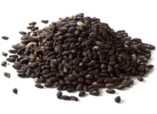
Sesame seeds are a good source of healthy fats, protein, B vitamins, minerals, fiber, antioxidants, and other beneficial plant compounds.
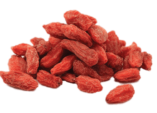
Goji berries contain high amounts of vitamins A, B, C, and E, along with being a good source of protein, iron, and calcium. They can help improve your dog’s bone, muscle, nerve and immune system.
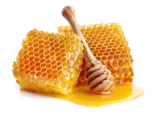
Honey has been linked to health benefits like improved heart health, wound healing, and blood antioxidant status.
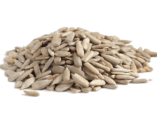
Sunflower seeds are high in protein and rich in healthy fats, as well as antioxidants that can lower your risk of developing serious conditions. It’s also an excellent source of: Vitamin E. Vitamin B1.
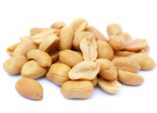
Peanuts are as popular as they are healthy. They’re an excellent plant-based source of protein and high in various vitamins, minerals, and plant compounds. They can be useful as a part of a weight loss diet and may reduce the risk of both heart disease and gallstones.
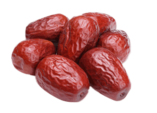
Red dates contain lots of fiber, vitamins A, B, and C, potassium, and calcium. They help improve digestion, particularly in dogs suffering from constipation.
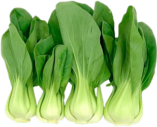
Bok choy contains calcium and is good for the heart. This low-calorie veggie is packed with vitamin A, vitamin C, and vitamin K, and potassium.
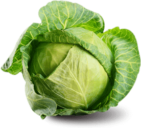
Cabbage is a rich source of important vitamins, such as vitamins K, C, B6, B1. It’s also chock full of healthy fiber and essential minerals including manganese, copper, potassium.
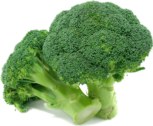
Broccoli is chock-full of fiber, which can aid in digestion and weight management. And it’s loaded with vitamins — including A, B, C, D, E and K — that may help promote overall well-being. Broccoli also contains lutein, a nutrient that supports eye and heart health, and other antioxidants that curb inflammation.
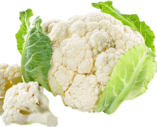
Cauliflower is a good source of fiber, vitamins K, vitamin C, calcium, potassium, and folate. These vitamins support the health of your dog’s vision, blood, liver, muscles, immune system, and more. Fiber is good for your dog’s colon health, weight issues, and bowel issues.
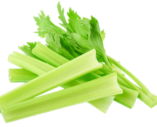
Celery is very low in fat and cholesterol and is an excellent source of fiber; vitamins A, C, and K; folate; potassium; and manganese. The crunchy veggie also might freshen up your dog’s breath.

French beans are full of important vitamins and minerals, such as protein, iron, calcium, and vitamins B6, A, C, and K. French beans are also full of fiber and are low in calories, which can help dogs feel full when they are dieting.

Okra is safe for dogs and contains vitamin C, B vitamins, potassium, magnesium, calcium, and folic acid. These vitamins and minerals support the health of your dog’s immune system, metabolism, nerves, muscles, bones, and more.

Green peas are a good source of vitamins, including A, K, and the B vitamins. They’re packed with minerals like iron, zinc, potassium, and magnesium. They’re also rich in protein and high in fiber. Green peas contain lutein, an anti-oxidant good for skin, heart, and eye health.

Parsley is rich in a variety of important vitamins and minerals for your pet. Parsley is a natural source of Vitamin C, A, and K. It helps to provide immune support and the development of your pet’s vision and immune health. Parsley is one of the best natural sources of Vitamin K which helps maintain a healthy blood clotting system and promotes liver health. Parsley is also rich in folic acids and antioxidants. It has anti-inflammatory properties that help promote good kidney health and antimicrobial properties that promote good urinary health.

Basil is healthy for your dog. It’s anti-inflammatory and contains a high level of antioxidants that help prevent many types of illness including cancer. Basil also helps prevent cellular damage, calms your anxious dog, and eases arthritis pain.

White radish can help dogs with their digestion process and it is a great tool to assist dogs to sustain strong muscles. It is packed with lots of beneficial nutrients such as fiber, Vitamin C, folate, calcium, iron, magnesium, and many more.

Carrots are rich in vitamin A, vitamin K, potassium, biotin, and vitamin B6.

Potatoes are rich in iron, fiber, vitamin C, calcium, and zinc.

Pumpkin contains vitamins like A, C, and E, as well as minerals like iron and potassium. Due to its high soluble fiber content, pumpkin is very good for your dog’s digestion.

Asparagus is high in folic acid, potassium, fiber, thiamin, vitamin A, and vitamin B6, important nutrients for dogs. Asparagus is also high in fiber.

Tomato is high in fiber, which aids digestion, and rich in vitamin A and C to help boost your pet’s vision and promote healthier skin.

Bell peppers are rich in vitamins A, E, B6, and lutein and are great sources of vitamin C and beta-carotene, which are antioxidants important for a dog’s healthy immune system

Ginger contains many antioxidants that can support dogs with motion sickness, blood circulation, nausea, gastrointestinal problems, and bloat. Ginger is anti-inflammatory and also help dogs with arthritis.

Turmeric contains a compound called curcumin – which is essentially its active ingredient. Curcumin has antioxidant, anti-inflammatory, antiviral, antibacterial, antifungal, wound healing and anticancer activities. It can help fight diseases like arthritis, diabetes, cancer, liver disease, gastrointestinal issues and more.

Shiitake mushrooms are a high protein source and contain many of the same amino acids as meat. Whether fresh or dried, shiitake mushrooms contain a long list of beneficial nutrients. This includes vitamins and minerals, enzymes, fiber, essential fatty acids and antioxidants. Shiitake mushrooms are used for their antiviral, antibacterial and antifungal properties.

Shimeji is rich in B vitamins, biotin, copper, provitamin D2, niacin, phosphorus, potassium, riboflavin and zinc. It has antimicrobial and anti-parasitic properties, thanks to protease enzymes that have a nematicidal effect. They are also rich in glycoprotein, marmorin, beta-glucan, hypziziprenol and hypsin, compounds that may inhibit the growth of certain cancer cells.

Eryngii is full of health-supporting nutrients, such as naturally occurring antioxidants – ergothioneine, an antioxidant that helps reduce damage from free radicals and oxidative stress. Eryngii also contains a high quantity of selenium. It has anti-viral properties as well.

Apples are an incredibly nutritious fruit that offers multiple health benefits.
They’re rich in fiber and antioxidants. Eating them is linked to a lower risk of many chronic conditions, including diabetes, heart disease, and cancer.
Apples may also promote weight loss and improve gut and brain health.

Pineapple contains plenty of nutrients and beneficial compounds, such as vitamin C, manganese, and enzymes to help aid digestion. Eating pineapple may help boost immunity, lower cancer risk.

Sweet potatoes are versatile and nutritious, packing a good amount of vitamin A, vitamin C, and manganese into each serving. They also have anti-cancer properties and may promote immune function, gut health, brain function, and eye health.
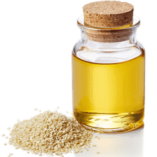
Sesame oil is high in antioxidants which help to reduce cell damage. It also has strong anti-inflammatory properties which help to reduce inflammation and protect from inflammation that leads to illness. Sesame oil is rich in omega-6 fatty acids and has unsaturated fats which are suitable for heart health.
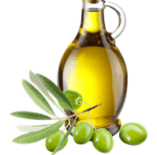
Olive oil is rich in antioxidants — including polyphenols, vitamin E, chlorophyll and carotenoids. These help boost your dog’s immune system and make them less likely to be impacted by common illnesses. It is also a good source of omega-3 fatty acids, which helps keep Fido’s skin moisturized as well as promote a shiny coat.
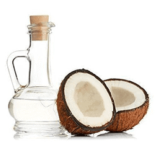
Coconut oil can increase energy levels, improve skin and coat, improve digestion, and reduce allergic reactions. Medium-chain fatty acids, like coconut oil, help with physical and digestive ailments because they are directly absorbed in the GI tract and go directly to the liver where they are metabolized into utilizable energy.
Feeding Guidelines
Defrost in the fridge overnight.
OR
Place the entire package of food into a bowl of warm water (not hot) for a quick thaw.
Steam.
OR
Heat the food in the microwave before serving.
Served Warm.
NOT HOT
Diet Transition

25 % new food, 75 % old food
50 % new food, 50 % old food


75 % new food, 25 % old food
100% new food


DAY 1 – 3 : 25 % new food, 75 % old food

DAY 4 – 7 : 50 % new food, 50 % old food

DAY 8 – 10 : 75 % new food, 25 % old food

DAY 11 : 100 % new food
